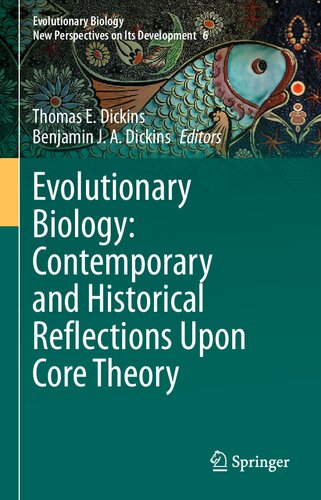

Most ebook files are in PDF format, so you can easily read them using various software such as Foxit Reader or directly on the Google Chrome browser.
Some ebook files are released by publishers in other formats such as .awz, .mobi, .epub, .fb2, etc. You may need to install specific software to read these formats on mobile/PC, such as Calibre.
Please read the tutorial at this link: https://ebookbell.com/faq
We offer FREE conversion to the popular formats you request; however, this may take some time. Therefore, right after payment, please email us, and we will try to provide the service as quickly as possible.
For some exceptional file formats or broken links (if any), please refrain from opening any disputes. Instead, email us first, and we will try to assist within a maximum of 6 hours.
EbookBell Team

5.0
100 reviewsThis book is reflecting upon core theories in evolutionary biology – in a historical as well as contemporary context. It exposes the main areas of interest for discussion, but more importantly draws together hypotheses and future research directions.
The Modern Synthesis (MS), sometimes referred to as Standard Evolutionary Theory (SET), in evolutionary biology has been well documented and discussed, but was also critically scrutinized over the last decade. Researchers from diverse disciplinary backgrounds have claimed that there is a need for an extension to that theory, and have called for an Extended Evolutionary Synthesis (EES).
The book starts with an introductory chapter that summarizes the main points of the EES claim and indicates where those points receive treatment later in the book. This introduction to the subjects can either serve as an initiation for readers new to the debate, or as a guide for those looking to pursue particular lines of enquiry.
The following chapters are organized around historical perspectives, theoretical and philosophical approaches and the use of specific biological models to inspect core ideas. Both empirical and theoretical contributions have been included. The majority of chapters are addressing various aspects of the EES position, and reflecting upon the MS. Some of the chapters take historical perspectives, analyzing various details of the MS and EES claims. Others offer theoretical and philosophical analyses of the debate, or take contemporary findings in biology and discuss those findings and their possible theoretical interpretations. All of the chapters draw upon actual biology to make their points.
This is written by practicing biologists and behavioral biologists, historians and philosophers. A valuable resource for historians and philosophers of biology as well as for biologists. …